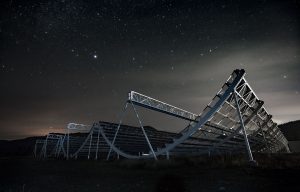
Blasts of radiation detected every 16 days, which could help explain mysterious bursts of energy from space.
FOR IMMEDIATE RELEASE (June 17, 2020) – A Canadian-led team of astronomers, including researchers from the University of Toronto and the Dunlap Institute for Astronomy & Astrophysics, has discovered that a repeating fast radio burst (FRB) originating from a nearby galaxy pulses at regular intervals.
Researchers within the Canadian Hydrogen Intensity Mapping Experiment (CHIME) Fast Radio Burst Collaboration used the CHIME telescope in British Columbia to show that the repeating radio source known as FRB 180916.J0158+65 – first discovered in 2018 by the same group – pulsates every 16.35 days.
The findings, described in a study published today in Nature, are the first to demonstrate that repeating FRBs can burst predictably.
For researchers, this was unexpected. “We were surprised by the fact that the FRB has regular activity on the time scale of weeks,” explained Dongzi Li, PhD student at the University of Toronto and corresponding author of the paper. “Most people would expect it to be at much shorter time scales, like seconds or even milliseconds, from rotation of a compact star. Any explanation for a 16-day cycle is likely very different.”
FRBs were discovered over a decade ago. First thought to be singular events, astronomers have since learned that some of these high-intensity blasts of radio emissions in fact, repeat.
Though the explanation for the mysterious phenomenon is still elusive, the new study is another step towards determining what might be causing FRBs.
“There are suddenly lots of concrete questions to ask and to follow-up on,” explains Li. “If any observed properties of the bursts change regularly with the same 16.35-day period, it will tell us about the environment close to the burst.”
Earlier this year, astronomers in Europe, in partnership with the CHIME/FRB Collaboration, were able to pinpoint FRB 180916 to a nearby galaxy located 500 million light years from Earth. Astronomers worldwide are now studying the source with a variety of telescopes, in the hopes of explaining the repetition.
_________________________________________________________________
About the CHIME Fast Radio Burst Collaboration
CHIME/FRB is a collaboration of over 50 scientists led by McGill University, University of British Columbia, the University of Toronto, the Perimeter Institute for Theoretical Physics, and the National Research Council of Canada (NRC). The $16-million investment for CHIME was provided by the Canada Foundation for Innovation and the governments of British Columbia, Ontario and Quebec, with additional funding from the Dunlap Institute for Astronomy and Astrophysics, the Natural Sciences and Engineering Research Council and the Canadian Institute for Advanced Research. The telescope is located in British Columbia’s Okanagan Valley at the NRC’s Dominion Radio Astrophysical Observatory near Penticton. CHIME is an official Square Kilometre Array (SKA) pathfinder facility.
_________________________________________________________________
About this study
“Periodic activity from a fast radio burst source,” by the FRB/CHIME Collaboration, was published in Nature on June 17, 2020.
The CHIME/FRB Project is funded by a grant from the Canada Foundation for Innovation 2015 Innovation Fund, the Provinces of British Columbia and Québec, and by the Dunlap Institute for Astronomy and Astrophysics at the University of Toronto.
For more information, contact:
Cynthia Lee
McGill Media Relations Office
514-398-6754
cynthia.lee@mcgill.ca
To reach Dongzi Li, contact:
Meaghan MacSween
Communications and Multimedia Officer
Dunlap Institute for Astronomy & Astrophysics
University of Toronto
647-296-8272
meaghan.macsween@dunlap.utoronto.ca
The Dunlap Institute for Astronomy & Astrophysics at the University of Toronto is an endowed research institute with nearly 70 faculty, postdocs, students and staff, dedicated to innovative technology, ground-breaking research, world-class training, and public engagement. The research themes of its faculty and Dunlap Fellows span the Universe and include: optical, infrared and radio instrumentation; Dark Energy; large-scale structure; the Cosmic Microwave Background; the interstellar medium; galaxy evolution; cosmic magnetism; and time-domain science. The Dunlap Institute, Department of Astronomy & Astrophysics, Canadian Institute for Theoretical Astrophysics, and Centre for Planetary Sciences comprise the leading centre for astronomical research in Canada, at the leading research university in the country, the University of Toronto.
